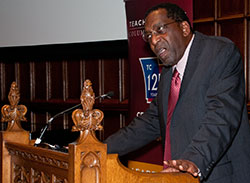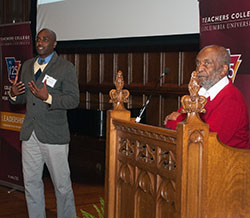Burying the Image of "the Wounded Negro"
Puncturing the stereotype of “the wounded Negro” was the focus of the noted educator and African American historian Charles M. Payne in delivering the inaugural Edmund Gordon Lecture, delivered at TC in early October.
“There’s a reduction going on,” Payne said. Even among well-intended activists for progress, “black people are reduced to their oppression.”
Payne – the Frank P. Hixon Distinguished Service Professor in the University of Chicago’s School of Social Service Administration and former Chief Education Officer for Chicago Public Schools – traced the evolution of the “wounded-Negro” trope across past social movements. The abolitionists employed it by mobilizing slaves to tell “horrible personal stories,” Payne said, while the “friends of the Negro would handle the analysis part.” The Depression-era Communists similarly portrayed black people as oppressed workers rather than as protagonists “developed enough” to be capable of Marxism’s “scientific analysis of society.”
Payne’s lecture was accompanied by a tribute to Edmund Gordon, TC’s 93-year-old Richard March Hoe Professor Emeritus of Psychology and Education, who attended the event along with his wife and partner on much of his work, the physician Susan Gordon. Both the lecture and the event were part of TC’s Educating Harlem Project, a collaboration between the College’s Program in History and Education and the Institute for Urban and Minority Education (IUME), which Gordon founded in 1973, with support from TC’s Center on History and Education.
“I don’t think a day goes by when I don’t cite or quote Ed Gordon,” TC President Susan Fuhrman said in her opening remarks. “Our concerns about equity, assessment, diversity – everything we think about at TC, which is so focused on its mission of social justice – has been shaped by his thinking,.”
Black thinkers like Frederick Douglass, Sojourner Truth and Ralph Ellison exposed and rejected the “wounded Negro” as belittling of individuality and experience, Payne said, but the image endured, in part as a useful device for “friends of the Negro not above trading on Negro suffering.” The stereotype also played to the activists’ narratives of themselves as heroes or saviors. Payne pointed out that some black leaders spun their own versions of the theory as well.
Payne suggested that the “wounded Negro” thesis lives on in the argument advanced by many current education reformers that “schools can’t do it alone.” In the 1970s, he said, the claim that African-American children were handicapped by cultural factors and the purported breakdown of the black family was “right out there in front.” Today, he said, it still lurks in arguments that poverty and other out-of-school factors “overwhelm the capacity of schools” to deliver positive outcomes.
In the process, Payne said a conservative argument has become one held by progressives. “Isn’t it bizarre when conservatives are saying ‘Kids are fine,’ while progressives are saying, ‘Fix poverty before we fix schools?’ The world is standing on its head!”
Payne took care to emphasize he was not arguing against poverty reduction or other out-of-school programs. “We all agree that poverty should be addressed,” he said. “But that has nothing to do with what schools can or cannot do.”
The variation in “performance metrics that actually matter” suggests there is plenty of scope for positive change at the level of school systems, Payne said. He cited the wide variations in gains in math and reading proficiency scores on the National Assement of Education Progress (NAEP) from near-stagnation in some places to successes in others, like Montgomery County, Md., and Boston, where “change is very real.”
Of course, out-of-school factors could play a part in the success stories as well, Payne said. But what is lacking is the data and rigorous analysis to sort out what progress comes from the “thinking and action of school leaders” versus other factors. At present, he said, too much school-level thinking is tangled in sterile debates over closing schools and firing teachers.
A more productive way forward, he argued, would involve shedding the residue of the “wounded-Negro” theory that manifests itself in the “reductionist discourse of every kid in the ghetto.” In fact, he said, needs are individual and many children are very close to being able to succeed. “Some kids need the Marine Corps, but some need just one more positive adult for 15 minutes a week,” Payne said.
Present debates, Payne argued, “don’t take into account that the majority of poor children and parents don’t experience schools as welcoming places. We need to figure out what happens when schools systematically make the effort to help kids feel they belong. Once we do that at some level of scale, only then can we know what schools can and cannot do.”
Deferring school-level investment of resources and study, Payne said, means falling back on reductionist, discredited notions of race and capability -- and it’s disrespectful to educators: “Emphasizing what schools can’t do before we look at what they can do insults generations of people who insisted on making a way out of no way.”
The power of Payne’s remarks were underscored by the tribute to Gordon, who in many ways has devoted his career to debunking damaging stereotypes of African Americans.
“You can talk about the all the fields in which he is an expert, or the methodological dexterity, or the number of people whom he has mentored and been a legend to, but perhaps his key contribution is that Professor Gordon is as responsible as anyone for seriously reframing the way we have thought about the young peop;le we teach, the families they come from and the neighborhoods they live in, not as deficits, but as possibilities,” said Morrell. “You change your perceptions and all kinds of things become possible – and that is the gift he has given us over 65 years as an intellectual, an advocate, a mentor, a professor, a scholar, a director and an administrator.”
Gordon himself closed the evening by thanking Teachers College and “so many of you who have made the journey for me so rewarding. Perhaps the best reward for my efforts, and for my wife’s companionship in trying to make our contributions, is the people like our speaker tonight and my successor as director of IUME, and about 75 to a hundred young scholars like them. It’s worth living to 93 to be able to see them.”Published Tuesday, Nov. 19, 2013

